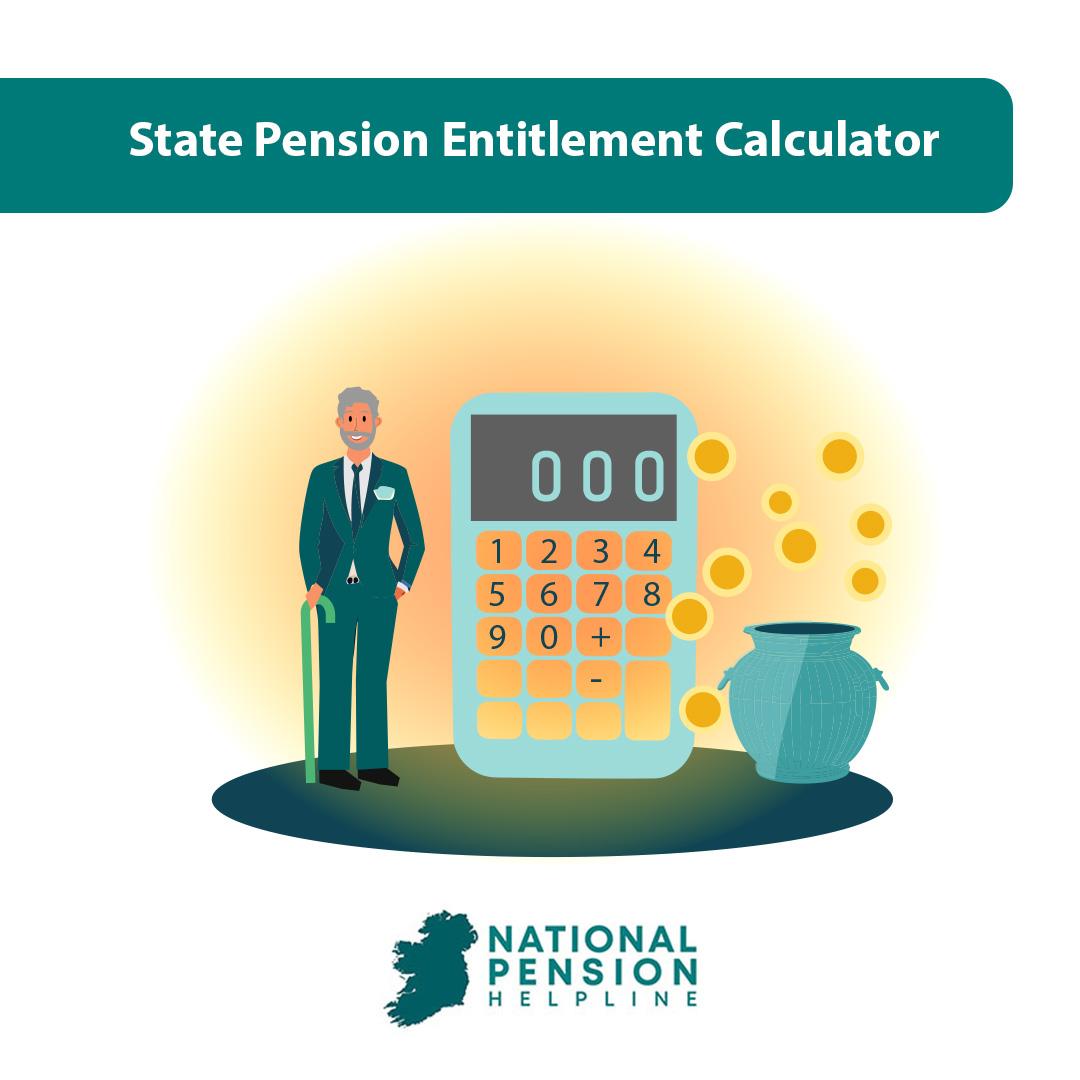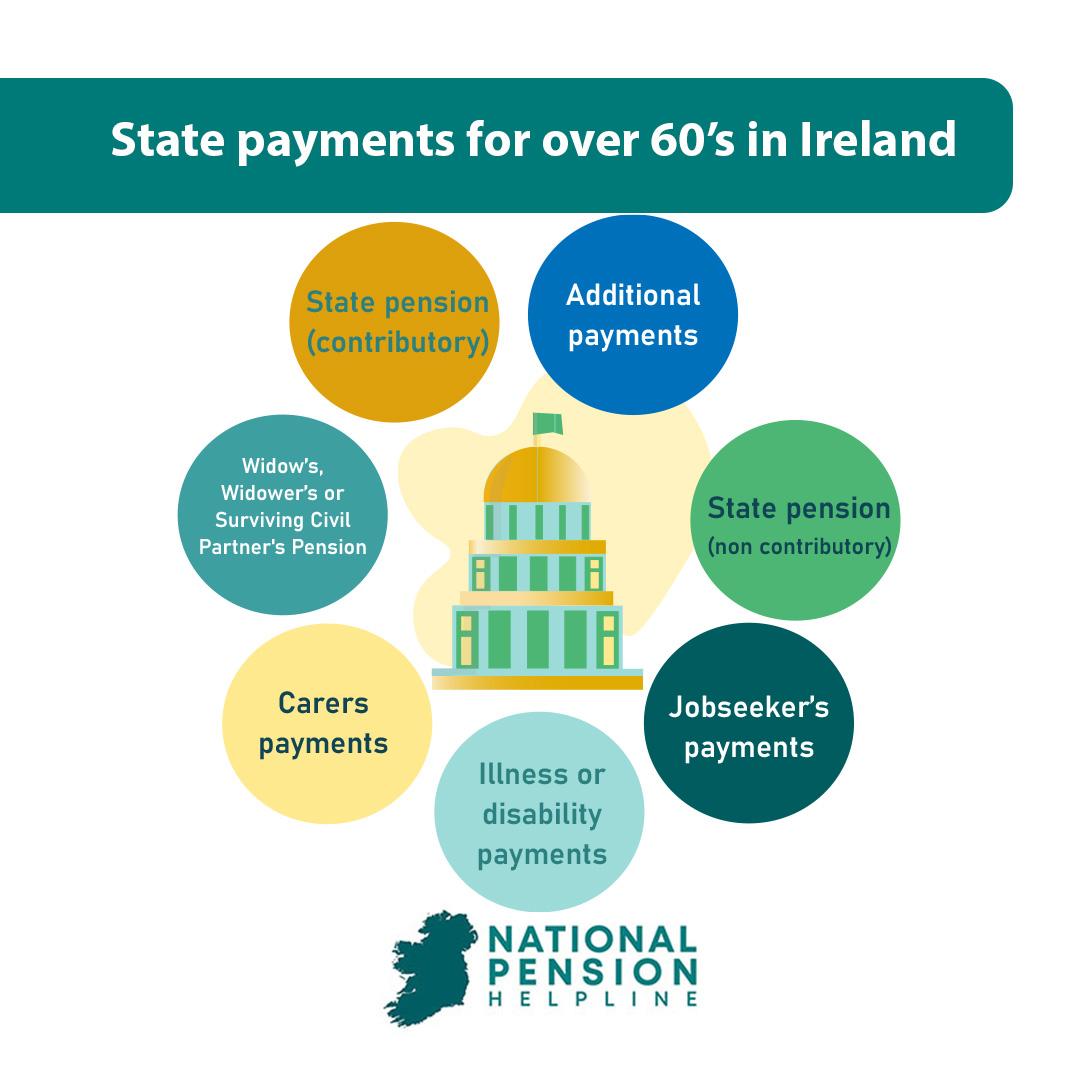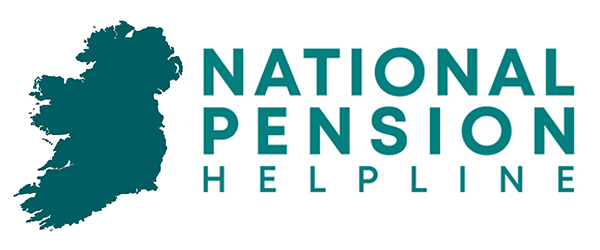Calculator is in beta testing, Full calculator coming 2025.
When planning for your retirement, it is important to know what entitlements you may have in order to utilise all state supports available to you.
There are a variety of state payments available to older persons in Ireland and having a knowledge of these payments is key to making informed decisions about your retirement finances.
The National Pension helpline offers a free range of calculators to manage your finances. For more advice on your pension or retirement finances, make an inquiry today and speak to a pension expert.

Table of Content
Retirement age in Ireland
There is no age of retirement set out in employment law in Ireland. The State Pension age is 66, however you can choose to defer claiming your State Pension (Contributory) up to the age of 70.
You may be able to continue working past the age of 66, depending on your type of employment ie. public or private sector workers. There is no set retirement age for those who are self employed.
Some public sector workers, for example Gardai and firefighters, may have a statutory retirement age of 55 or 60, depending their circumstances.
State payments for over 60’s in Ireland
1 in 3 workers in Ireland do not have a personal pension or workplace pension and plan to rely very heavily on state support into retirement.
There are several state payments for older persons in Ireland, including the State pension (contributory and non contributory). The rate of State Pension (contributory and non contributory) was €277.30 per week in January 2024.
Some of these payments may require you to have made a specific number of PRSI contributions, and some may be means tested.
A payment that is means tested will depend on any income you, or your spouse or partner, has from other sources being below a certain threshold. The income threshold may vary, depending on the state payment you are applying for.
If you qualify for these payments, you may also qualify for an Increase for a Qualified Adult or an Increase for a Qualified Child. Your spouse or partner would be considered a Qualified Adult if their income is below a certain amount. In 2024, the increase for a Qualified Adult aged over 66 is €248.60.
When calculating the amount your can claim in state pension entitlements, consider the following:

State pension (contributory)
The State Pension in Ireland is available from the age of 66, although you may choose to defer claiming your State pension up to the age of 70.
Eligibility for the State pension depends on having made sufficient PRSI contributions during your working life. The minimum number of contributions in order to qualify is 520 (equivalent to 10 years contributions).
The rules around qualifying for the contributory State pension are complex, but in order to qualify for the maximum rate of contributory pension, you would need 4080 contributions (approximately equivalent to 40 years contributions).
It is possible to qualify for the State pension (contributory) if you have spent some years as a carer or homemaker, as up to 20 years home caring is allowed.
The State pension (contributory) is not means tested so it is possible to qualify for this payment if you have income from other sources, such as a private pension or part time work.
State pension (non contributory)
This is a means tested payment for those who are over 66 and no longer in employment. If you do not qualify for a State pension (contributory), you may qualify for the State pension (non contributory).
As this is a means tested payment, you may not qualify if you have another source of income. You must also ordinarily reside in Ireland and have a proven link to the State to qualify.
Jobseeker’s payments
Jobseeker’s benefit and Jobseeker’s Allowance are weekly payments for those who are out of work and seeking employment. To qualify for these payments, you must be resident in Ireland and satisfy a habitual residence condition.
In 2024, the full rate of jobseeker’s Benefit for a single adult is €220 per week.
There are conditions around taking part in the Department of Social Protection’s job activation process, but if you are over 62 you are not obliged to participate.
If you finish working at 65, you may qualify for the Benefit Payment for 65 Year Olds, before qualifying for a State Pension at 66.
If you do not qualify for any other State payment and have no other source of income, you may qualify for a means tested Supplementary Welfare Allowance.
Illness or disability payments
If you are aged under 66 and you have an illness or disability that prevents you from working, you may be eligible for an illness or disability payment. The full rate of Illness Benefit and Disability allowance in 2024 is €220 per week.
Illness Benefit and Invalidity Pension are payments for those who are unable to work. Illness Benefit is a short term payment (up to 2 years) and Invalidity pension is for those whose illness or disability prevents them from working long term. Both of these payments are based on PRSI contributions you have made while working.
Disability Allowance is a means tested payment for those who cannot work for over a year and are severely restricted in their ability to work.
You can transfer to a State Pension at age 66 if you have been in receipt of these payments.
Carer’s payments
Some older people are in a position where they cannot work as they are caring for another. If you provide care for another you may be eligible for either Carer’s Benefit or Carer’s Allowance. The rates of Carer’s Allowance and Carer’s benefit vary depending on your age and the number of people you provide care for.
Carer’s Benefit is based on PRSI contributions and Carer’s Allowance is means tested. You may also get half the rate of Carer’s Allowance if you are in receipt of a social welfare payment and providing care to another person.
The Carer’s Support Grant is paid annually to carers who qualify for this payment. In 2024, the rate of Carer’s Support Grant was €1,850 once per year.
There are conditions around the relationship of the person you provide care for to you as well as the level of care that the person requires that determine eligibility for these payments.
Widow’s, Widower’s or Surviving Civil Partner’s Pension
If you are a widow, widower, or surviving civil partner of someone who has died then you may be eligible for either the Widow’s, Widower’s, or Surviving Civil Partner’s Pension (either contributory or non contributory).
The maximum weekly rate of Widow’s, Widower’s, or Surviving Civil partner’s Pension is €277.30.
If you are the surviving spouse or civil partner who has died and who had sufficient PRSI contributions to qualify, you may be eligible for the Widow’s, Widower’s, or Surviving Civil Partner’s Pension (contributory).
The Widow’s, Widower’s, or Surviving Civil Partner’s Pension (non contributory) is a means-tested payment for those who are under 66 and do not have dependent children who do not qualify for the contributory payment.
The Widowed or Surviving Civil Partner Grant is a one off payment to former spouses or civil partners with dependent children.
Additional payments
The Household Benefits Package entitles you to assistance with electricity or gas payments and a free TV licence. Everyone over 70 is eligible for this payment.
The Living Alone Increase is an additional weekly payment to those who receive certain payments and who live alone. If you qualify for this payment and a Fuel Allowance, you may also be eligible for a Telephone Support Allowance.
The Fuel Allowance is an additional payment in winter for those who rely on some social welfare payments long term.
If you are on a lower income or relying on a State Pension or you are over 70, you may also be eligible for a medical card or a GP Visit card to cover some or all of any medical expenses you may have.
Tax and over 65’s in Ireland
If you are over 65, or your spouse or civil partner is over 65 and you are jointly assessed for income tax, there are some tax measures for which you may be eligible.
There are tax exemption limits for people who are over 65 meaning that you do not have to pay income tax if you income is below the limit. The tax exemption limit for a single person, widowed person, or surviving civil partner is currently €18,000 per year and the limit for a couple who are married or civil partners is €36,000 per year.
Tax credits applied to your income reduce the amount of tax you pay. The Age tax credit is an additional tax credit for those who are over 65. It is a credit of €245 for a single person, widowed person, or surviving civil partner, or a tax credit of €490 for a couple who are married or civil partners. Thuis credit is in addition to any personal tax credit(s) you may have.
If you have contributed to a private or occupational pension, you may benefit from Pension Tax Relief on those contributions as well as any lump sum provided on retirement, subject to certain limits based on your age and income. However, your pension income is taxable.
It is worth noting, also, that the age at which you cease to be required to pay PRSI is 70.
There is also tax relief available on a range of costs that may apply to older persons such as:
Start planning your retirement today
State pension and other entitlements can help you to have the income and lifestyle you require when you have finished working and wish to retire.
Our State Pension calculator can be used to get an idea of your State Pension entitlements and will help you to plan for a comfortable retirement.
Fill in our online assessment or contact our helpline today and start planning your retirement finances. A Central Bank regulated pension advisor can discuss your pension options with you, without any charge.
To find out how much is in your personal pension, try the National Pension Helplines Pension Calculator and find out how close you are to your retirement goals.


